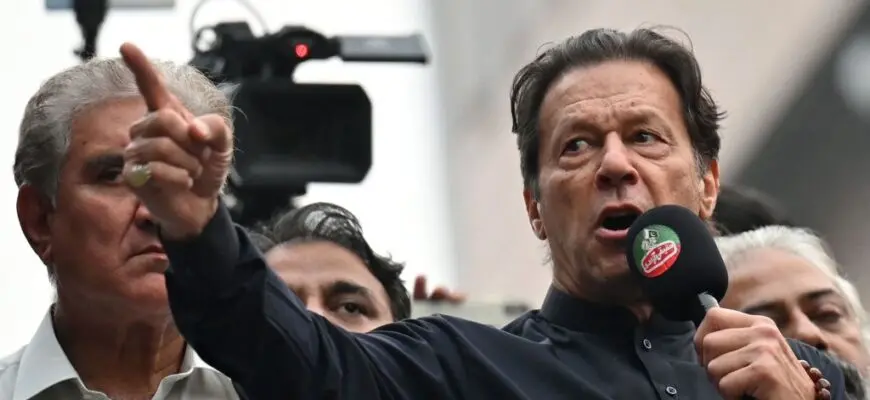Imran Khan, the former prime minister of Pakistan, currently serving a 14-year sentence, recently described his solitary confinement in Adiala Jail as being held in a 9-by-11 foot “cage.” His imprisonment follows a politically charged legal crackdown after he fell out with the country’s powerful military establishment.
Khan, who is 72, wrote a letter to the Chief Justice of the Supreme Court detailing his harsh conditions, stating: “I have endured continued solitary confinement. All access to books and newspapers has been denied to me.” His letter serves as a plea for mercy and suggests his fading hopes of legal reprieve.
Millions of Khan’s supporters and members of his party, Pakistan Tehreek-e-Insaaf (PTI), maintain that the numerous legal charges against him are fabricated and politically motivated. While he has been convicted in some cases, many others are ongoing; recently, a Lahore court denied his petition to merge the entangled cases.
After aligning PTI with the military in the early 2010s, Khan eventually rose to power as prime minister in 2018. However, the power-sharing arrangement collapsed, and he was ousted via a parliamentary no-confidence vote in April 2022. Khan subsequently blamed the army and the United States for engineering his removal and led energetic protests demanding immediate elections.
Following a brief arrest in May 2023, Khan’s followers attacked Pakistan’s military headquarters in Rawalpindi and the home of a senior military official in Lahore. Khan stands accused of instigating those attacks. A severe crackdown on the PTI ensued: most leaders were arrested or forced to resign, hundreds of workers were imprisoned, and Amnesty International recorded cases of family members being “forcibly disappeared.” The party has largely lost its street power and ability to protest.

Rawalpindi, the garrison city housing the Pakistan Army’s headquarters, has historically been the site of trials for politicians who clashed with the military. Former Prime Minister Zulfikar Ali Bhutto was imprisoned, tried, and executed there in 1979. Fearing the original prison might become a memorial, it was demolished and replaced with Adiala Jail, where Khan is currently held. Other notable political figures, including former Prime Minister Yousaf Raza Gilani and current Punjab Chief Minister Maryam Nawaz Sharif, have also been detained at Adiala.
The proceedings against Khan have been shaped by political calculations. To prevent the public from seeing the charismatic politician during transfers, the government established a makeshift courtroom inside the Adiala Jail complex. Judges from the Islamabad high court justified this unusual measure by citing a 100-year-old precedent from colonial India’s Bombay High Court, which permitted trials outside a standard courtroom during special circumstances, such as a plague outbreak.
The task of disentangling the estimated 200 criminal cases filed against Khan since his 2022 removal is arduous. The accusations are broad, covering charges like stealing state gifts, land grabs, an unlawful Islamic marriage, disclosing state secrets, and instigating violent attacks. Khan’s wife, Bushra Bibi, has been named a co-accused in several cases. While Khan and his wife have been acquitted of disclosing state secrets and the unlawful marriage charge, many serious allegations remain.
Recently, the case involving a Bulgari jewelry set has dominated the trial. The Saudi royal family gifted Khan and his wife the set while he was in office. Under law, a prime minister must record and deposit state gifts with the state treasury. The prosecution presented witnesses who testified that while Khan was PM, an aide—acting on Bushra Bibi’s directions—coerced a jewelry appraiser into grossly undervaluing the set, worth approximately $500,000, at just $38,000. By paying this reduced amount to the treasury, Khan and his wife were able to keep the set. The prosecution alleges Khan used similar malpractices to retain 107 other state gifts.
Khan is not the first Pakistani prime minister whose legal troubles are tied to jewelry. In 2003, a Swiss court found that Prime Minister Benazir Bhutto and her husband, Asif Ali Zardari, received illicit kickbacks for a government contract. Funds from these commissions, channeled through offshore accounts, were used by Bhutto to purchase a diamond necklace in London.
Despite years of condemning graft, Khan seemingly compromised his principles by associating with dubious figures like Malik Riaz, a self-made real estate billionaire known for influencing Pakistani powerbrokers. Riaz was facing severe legal issues, including a 2019 Supreme Court case where his company, Bahria Town, agreed to pay a $3 billion fine over seven years. Concurrently, UK authorities froze Riaz’s assets, including a London mansion and bank accounts, worth about $250 million, due to a “dirty money” investigation. In December 2019, Riaz settled with the UK’s National Crime Agency, agreeing to hand over the money and property to Pakistan.
The prosecution alleges that Khan’s government ensured that $183 million of this recovered money—which should have gone to the national exchequer—was instead deposited into a Supreme Court account, effectively paying off Riaz’s previous fines. In exchange, Khan and his wife allegedly received billions of rupees and 20 hectares of land from Riaz through the Al-Qadir Trust, a foundation they established. For their roles in the Al-Qadir Trust case, Khan was convicted and sentenced to 14 years in prison, while his wife received seven years.
Khan also faces numerous cases in Pakistan’s Anti-Terrorism courts stemming from the May 9, 2023, attacks on military installations. An assault by civilians on the army headquarters is considered an unforgivable offense by the military establishment.

Charges have already been framed against Khan regarding the army headquarters attack. In a significant ruling, Pakistan’s Supreme Court ceded jurisdiction to military courts, overturning a previous decision that had voided civilian military trials and restoring contentious provisions of the Pakistan Army Act. This decision leaves little legal hope for Khan or other citizens caught in similar situations.
Following a recent conflict between India and Pakistan, the military leadership, led by Army Chief General Syed Asim Munir (who was awarded the rank of Field Marshal), has gained significant public and political power, renewing international support from the US, China, and Saudi Arabia. The consensus suggests that Khan’s only remaining path to freedom from his solitary cell is an extrajudicial deal with the military establishment.
This potential outcome, while common in Pakistani politics, signals a profound weakening of the country’s legal institutions. The dungeon stands to swallow yet another Pakistani prime minister.









